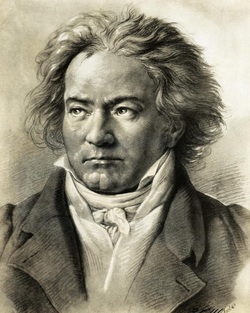
We don't often hear Davy Crockett and Ludwig van Beethoven mentioned in the same breath. Or at least I hadn't. Classical music, in fact, was pretty much the last thing on my mind on March 26, 2010, as I headed for Crockett country to begin reporting Born on a Mountaintop. Then I happened upon a radio station that was playing Beethoven's Second Symphony, and it suddenly hit me that the legendary American frontiersman and the immortal German composer were contemporaries.
They shared the planet for 41 years.
March 26, I soon learned, was the anniversary of Beethoven's death in 1827. That was the year David Crockett -- who was born in 1786 -- began his first term in Congress. It's not easy to think of them having much else in common, but let's give it a try.
* Beethoven was responsible for some of the most beautiful music ever written for strings. Crockett is said to have entertained his fellow Alamo defenders by playing the fiddle, though it's far from certain that he played the instrument at all.
* Beethoven had a thing for Napoleon, initially titling his Third Symphony the Bonaparte, though he soon had second thoughts about the name. Crockett met his end at the hands of the Mexican dictator Antonio Lopez de Santa Anna, who liked to call himself "the Napoleon of the West."
* "Throughout his life," wrote Beethoven biographer Edmund Morris, the composer"struggled against epic
They shared the planet for 41 years.
March 26, I soon learned, was the anniversary of Beethoven's death in 1827. That was the year David Crockett -- who was born in 1786 -- began his first term in Congress. It's not easy to think of them having much else in common, but let's give it a try.
* Beethoven was responsible for some of the most beautiful music ever written for strings. Crockett is said to have entertained his fellow Alamo defenders by playing the fiddle, though it's far from certain that he played the instrument at all.
* Beethoven had a thing for Napoleon, initially titling his Third Symphony the Bonaparte, though he soon had second thoughts about the name. Crockett met his end at the hands of the Mexican dictator Antonio Lopez de Santa Anna, who liked to call himself "the Napoleon of the West."
* "Throughout his life," wrote Beethoven biographer Edmund Morris, the composer"struggled against epic
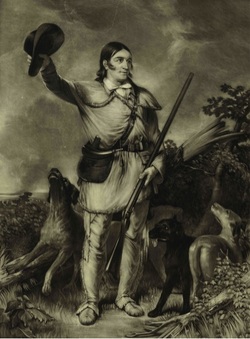
odds and prevailed with enormous courage." You could say the same about Crockett's lifelong struggle and his courage, whether or not you think he prevailed.
And then, of course, there's the Peanuts connection.
At the height of the Walt-Disney-and-Fess-Parker-inspired Crockett craze of 1955, cartoonist Charles Schulz produced a wonderful run of strips in which Charlie Brown (always in a coonskin cap) debates the Beethoven-obsessed Shroeder about whose hero is biggest and best. You can read some of these strips in John Harris's blog Roasted Peanuts -- which I highly recommend; there are more here -- but let me give you a bit of dialogue to whet your appetite:
Shroeder: "BEETHOVEN COULD DO ANYTHING DAVY CROCKETT COULD DO!"
Charlie Brown: "OH YEAH? DID HE KILL A BEAR WHEN HE WAS ONLY THREE?!! DID HE? HUH? DID HE?!"
Schroeder: "BEETHOVEN KILLED TWELVE BEARS WHEN HE WAS ONLY THREE."
How do you top an argument like that? Beats me, and it beat Charlie Brown, too. The strip ends with him just standing there, clutching a rifle that's at least twice as long as he is tall, giving his triumphant opponent the final word.
"IT'S A LITTLE KNOWN FACT OF AMERICAN HISTORY!" Shroeder says.
And then, of course, there's the Peanuts connection.
At the height of the Walt-Disney-and-Fess-Parker-inspired Crockett craze of 1955, cartoonist Charles Schulz produced a wonderful run of strips in which Charlie Brown (always in a coonskin cap) debates the Beethoven-obsessed Shroeder about whose hero is biggest and best. You can read some of these strips in John Harris's blog Roasted Peanuts -- which I highly recommend; there are more here -- but let me give you a bit of dialogue to whet your appetite:
Shroeder: "BEETHOVEN COULD DO ANYTHING DAVY CROCKETT COULD DO!"
Charlie Brown: "OH YEAH? DID HE KILL A BEAR WHEN HE WAS ONLY THREE?!! DID HE? HUH? DID HE?!"
Schroeder: "BEETHOVEN KILLED TWELVE BEARS WHEN HE WAS ONLY THREE."
How do you top an argument like that? Beats me, and it beat Charlie Brown, too. The strip ends with him just standing there, clutching a rifle that's at least twice as long as he is tall, giving his triumphant opponent the final word.
"IT'S A LITTLE KNOWN FACT OF AMERICAN HISTORY!" Shroeder says.
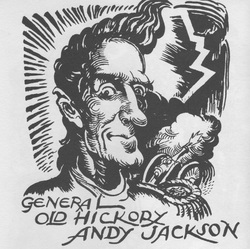
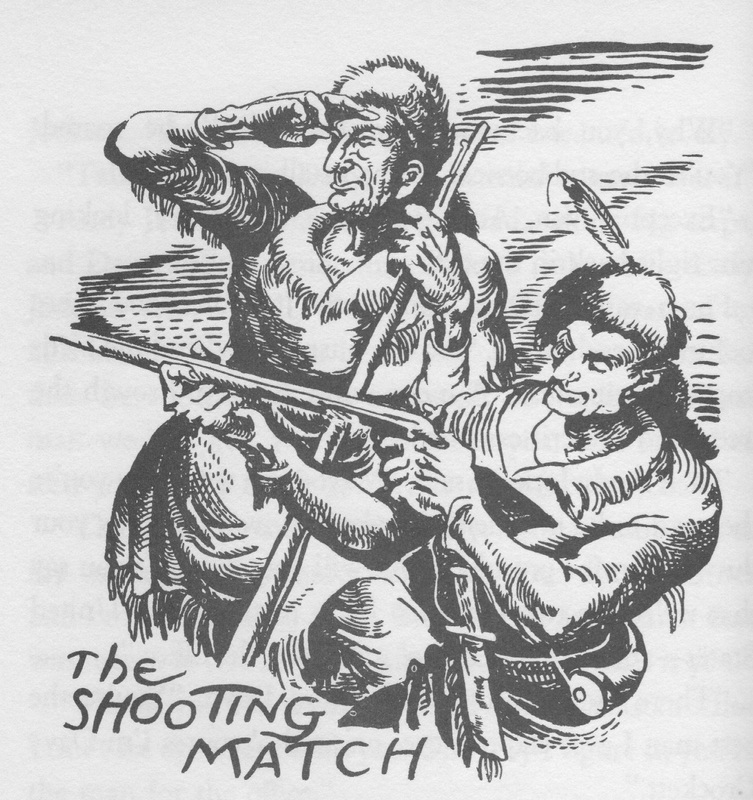
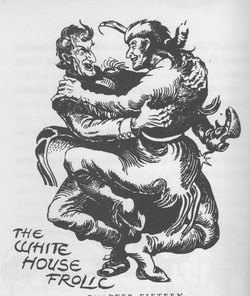

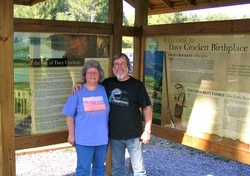
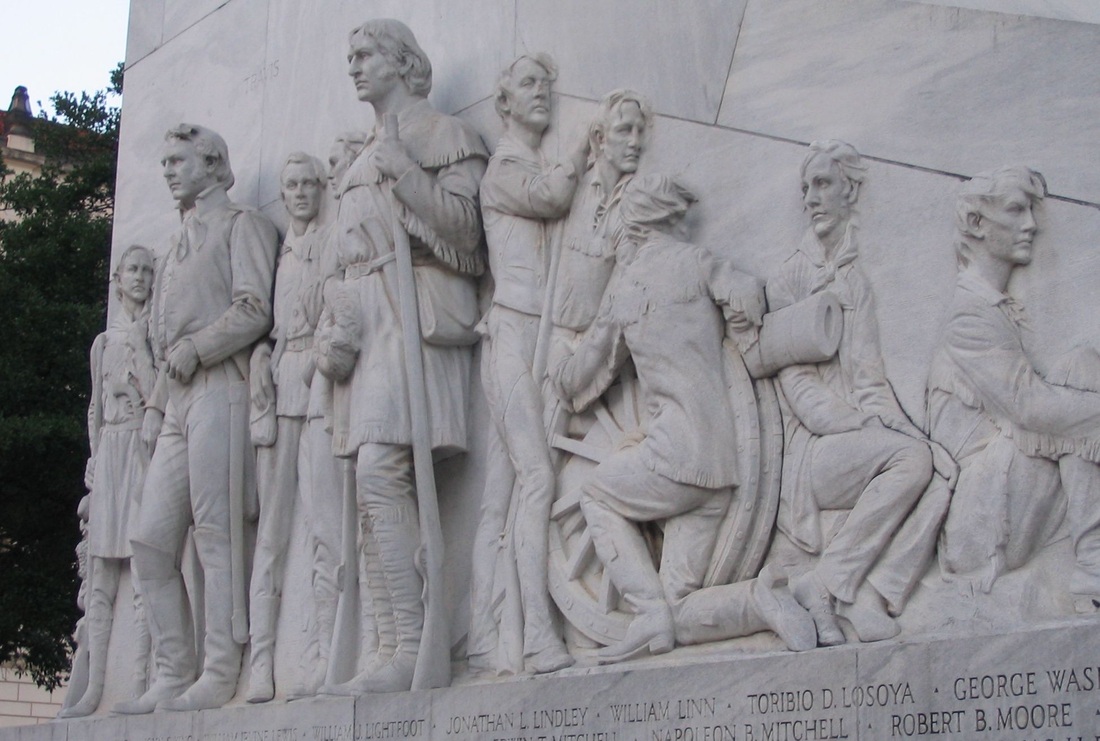
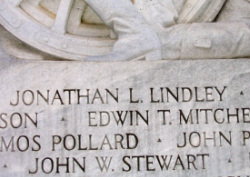
 RSS Feed
RSS Feed